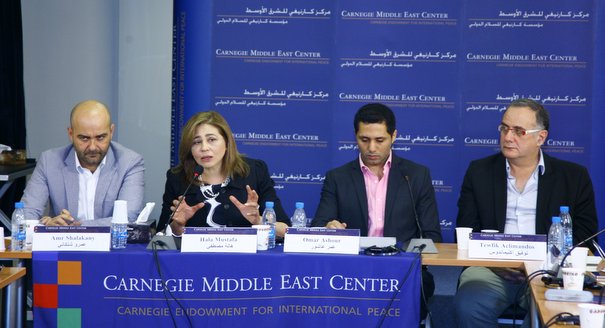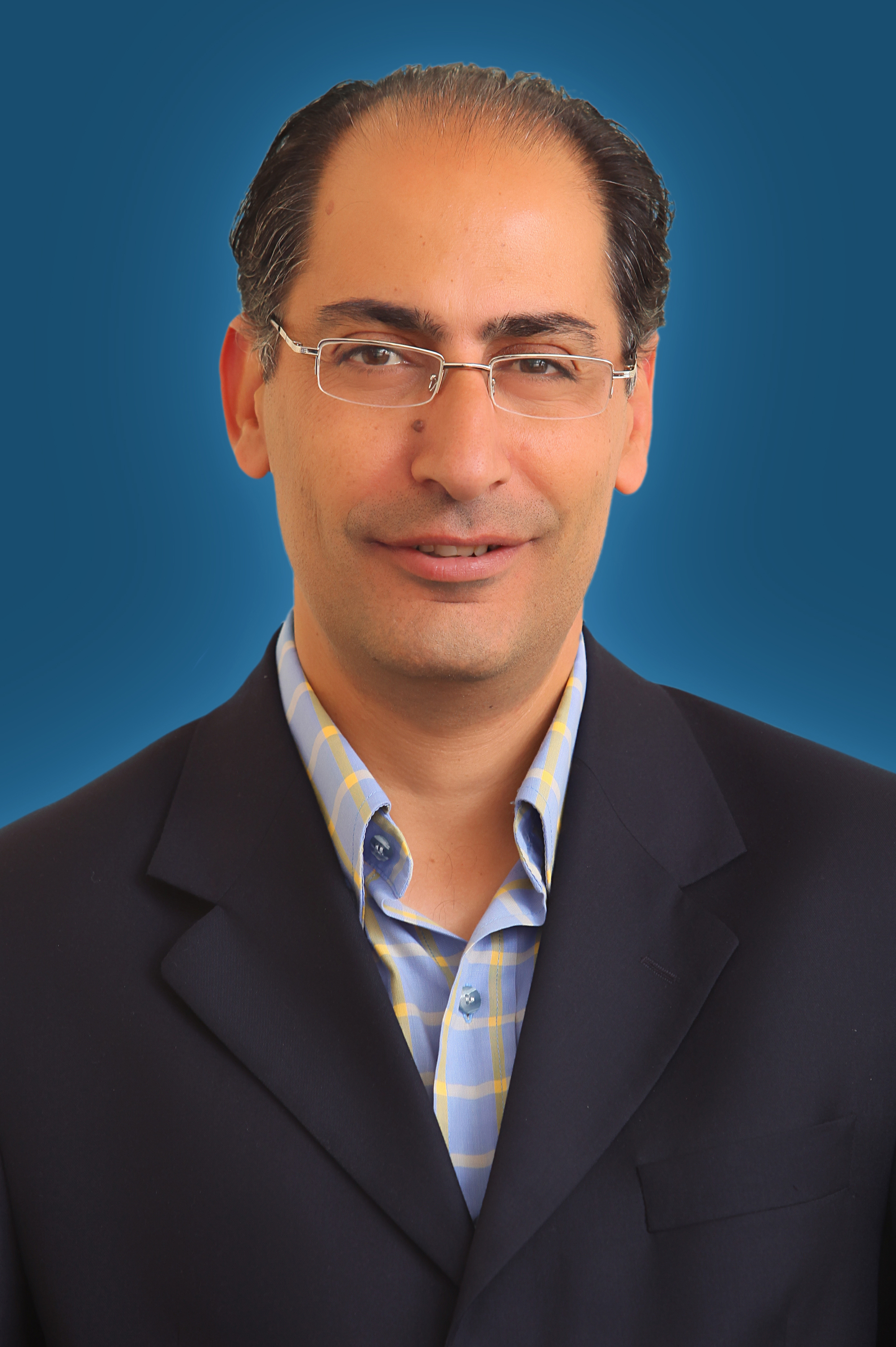{
"authors": [
"Zainab Abul-Magd",
"Tewfik Aclimandos",
"Omar Ashour",
"Hala Mustafa",
"Ibrahim Saif",
"Yezid Sayigh",
"Amr Shalakany",
"Samer Soliman"
],
"type": "event",
"centerAffiliationAll": "",
"centers": [
"Carnegie Endowment for International Peace",
"Malcolm H. Kerr Carnegie Middle East Center"
],
"collections": [],
"englishNewsletterAll": "",
"nonEnglishNewsletterAll": "",
"primaryCenter": "Carnegie Endowment for International Peace",
"programAffiliation": "",
"programs": [],
"projects": [],
"regions": [
"Egypt"
],
"topics": [
"Political Reform",
"Economy"
]
}
Egypt’s New President: Political and Economic Challenges
Fri, June 22nd, 2012
Beirut
The new president of Egypt will face myriad political and economic challenges. On the eve of the announcement of the presidential election results, the Carnegie Middle East Center hosted a round table discussion about the difficulties facing the next president and the consequences his first few months in office will have on the country and the entire region. Carnegie’s Yezid Sayigh moderated the discussion.
Great Expectations
Perhaps the greatest challenge faced by Egypt’s incoming president will be the population’s high expectations and aspirations, the discussants agreed. Both candidates made a number of campaign promises of reform and development that they may not be able to keep. Furthermore, Egyptian society is marked by a number of serious divisions which the president-elect will have to overcome. The speakers unanimously concluded that the new president’s success in addressing Egypt’s political and social challenges will be defined by how effectively he builds strong, cross-coalition alliances during his first few weeks in office.
Political Challenges
Continuing Revolution
Hosni Mubarak’s resignation last February did not signal the end of the revolution, agreed Tewfik Aclimandos of Collège de France and Hala Mustafa, of “Democracy Review”. It merely took the revolution into a new phase, where the people must elect and establish a new government. This is a delicate stage, and the Supreme Constitutional Court’s controversial rulings nullifying a third of the elected parliament just days before the presidential election only underlined the uncertainty still facing Egypt.
Potential Scenarios
From this point in the political transition, Omar Ashour of University of Exeter listed three historical examples Egypt might follow:
- Worst Case Scenario, Algeria 1992: In Algeria, the mobilization of Islamist forces led to deadly clashes with military establishment and a devastating civil war.
- Best Case Scenario, Spain 1982: The Socialist party assumed power peacefully after it won the general elections, and oversaw the gradual assertion of full civilian control over the armed forces over the next decade.
- The Middling Route, Turkey 1983: The military seized power and redrew the constitution in 1980-2003, yet it also successfully enacted economic reforms and maintained relative stability.
Polarization:
International media has described Egypt as seriously polarized, with deep schisms between secularists and Islamists, the regime and the revolution, the military and the Muslim Brotherhood. But Ashour warned that such simplistic summaries of the problems facing Egypt are dangerous and risk shifting the country closer to the violent path of Algeria in the 1990s. Amr Shalakany of the University of Cairo agreed, adding that many of the differences between the two candidates were wholly superficial and media-created. Thus, while the second round of presidential elections between Mubarak’s former prime minister and the Muslim Brotherhood candidate seemed to symbolize over half a century of divisive Egyptian politics, all speakers agreed that scholars and politicians must move beyond such rhetoric, or they risk making a polarization myth into reality.
Security Reform
The national police force is largely disheartened and confused, believing that they were on the losing side of the 2011 revolution, Aclimandos asserted. The Muslim Brotherhood and the SCAF need to focus less on fighting over who will gain power and more on what the country needs, he added. There are still circumstances within society which could boil over into further popular uprisings. For example, the unemployed youth that played such a significant role in the protests will not remain silent if their needs are not addressed. Furthermore, he added, there is a free flow of weapons from neighboring countries into Egypt, resulting in a heavily armed populace.
Economic Challenges
Fifteen Month Decline
The most immediate problem facing the new president economically is the country’s continued financial free-fall since the onset of the Revolution last January, Carnegie’s Ibrahim Saif asserted. Central Bank reserves are decreasing at a rate of 1.4 billion dollars a month and are now an estimated 40 percent of their value from January 2011. Though internal and external debt remains low in proportion to GDP, Saif emphasized that the government cannot overplay this one economic bright spot and ignore numerous mounting problems.
Lack of Transparency
With the country’s new political structure still undecided, Egypt has yet to establish a new economic plan or orientation, Saif said. The discussants listed several crucial shortcomings of previous regimes that must be addressed quickly by the new president:
- Taxation: Mubarak ruled by avoiding unpopular taxation measures for twenty years, Samer Soliman of the American University in Cairo explained. This allowed him to secure the loyalty of wealthy classes while allowing public services and institutions to decline. This deterioration of infrastructure, Zainab Abul-Magd of the American University in Cairo added, led to the revolutionaries’ calls for social justice and economic equality in January 2011. In order to respond to the public’s demands and implement the necessary development projects, he continued, increased state funds from tax returns are crucial.
- Lack of Confidence: The reluctance of the international community to grant loans to Egypt poses a major problem for the incoming president, Saif explained. Decisions by the IMF and the World Bank (as well as other organizations) to delay the grant of loans to Egypt has further diminished international confidence in Egypt’s economy, making the task of attracting independent foreign investors doubly difficult.
- Army’s Economic Power: The extremely wealthy military apparatus in Egypt is effectively a state within a state, Soliman asserted. Not only do the armed forces receive government financing, but they produce a wide range of non-military products, such as meats, oils, cement, chemicals, and pasta, added Abul Magd. To encourage job creation, Abul-Magd suggested that the army should withdraw from the civil economy, a move that Soliman agreed could enhance the army’s efficiency in future military endeavours.
- New Economic Model: By removing the army from civilian production, Abul-Magd contended that Egypt’s private sector could expand and develop, creating jobs for the millions of unemployed citizens. Such a shift could serve the dual purpose of enriching Egypt’s poorly defined private sector while establishing the country as a producer of diverse, quality goods, mimicking Turkey’s successful development model of the 1980s.
Carnegie does not take institutional positions on public policy issues; the views represented herein are those of the author(s) and do not necessarily reflect the views of Carnegie, its staff, or its trustees.
Event Speakers
Zainab Abul-Magd
Tewfik Aclimandos
Omar Ashour
Hala Mustafa
Saif is an economist specializing in the political economy of the Middle East. His research focuses on international trade and structural adjustment programs in developing countries, with emphasis on Jordan and the Middle East.
Yezid Sayigh is a senior fellow at the Malcolm H. Kerr Carnegie Middle East Center in Beirut, where he leads the program on Civil-Military Relations in Arab States (CMRAS). His work focuses on the comparative political and economic roles of Arab armed forces, the impact of war on states and societies, the politics of postconflict reconstruction and security sector transformation in Arab transitions, and authoritarian resurgence.
Amr Shalakany
Samer Soliman

